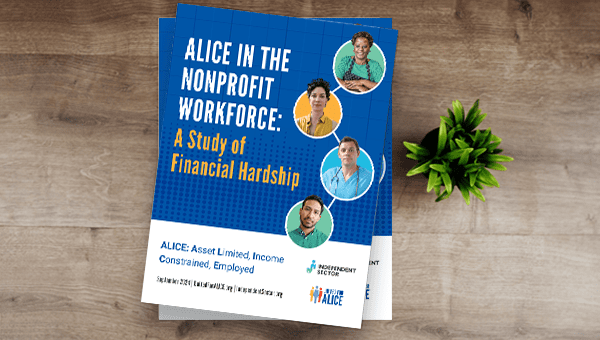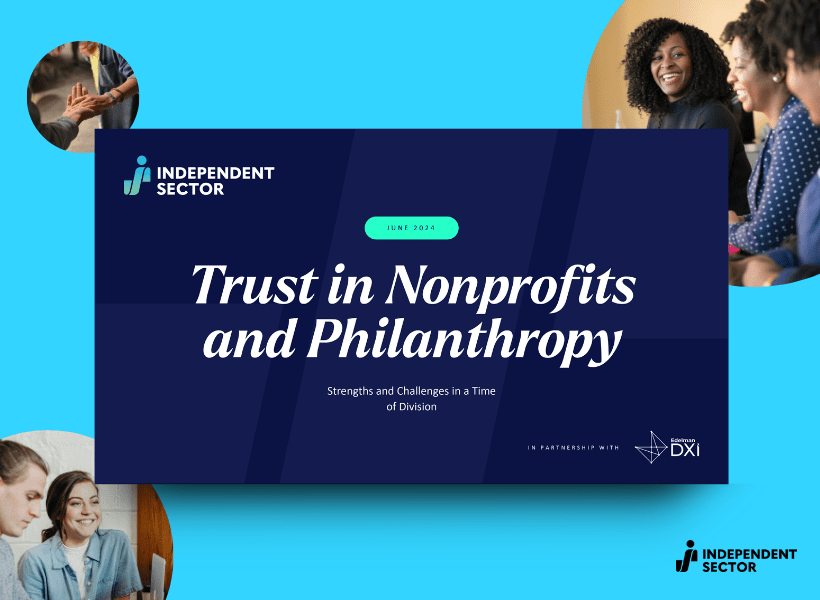Research report reveals critical need for nonprofits to use their advocacy voice through public policy process
(WASHINGTON, July 18, 2023) – Independent Sector (IS) released today the results of a nationally representative survey of nonprofit institutions that finds a significant decrease in nonprofit engagement in advocacy and lobbying over the last 20 years.
The research report, “The Retreat of Influence: Exploring the Decline of Nonprofit Advocacy and Public Engagement,” fills a 20-year gap in national data on nonprofits’ participation in public policy. It also adds new data on nonprofits’ nonpartisan civic engagement; digital engagement; and diversity, equity, and inclusion (DEI) initiatives.
In addition to exploring the significant decrease in nonprofit advocacy over the past two decades, “The Retreat of Influence” examines how nonprofit advocacy and lobbying interact with other forms of nonpartisan civic engagement.
The report’s key findings include:
- A significantly lower proportion of nonprofits report advocating or lobbying compared to 20 years ago. Only 31% of nonprofits report engaging in advocacy or lobbying over the last five years — less than half the percentage in 2000.
- Mission plays the largest role in determining nonprofit advocacy and lobbying. Approximately 70% of nonprofits that engage in policy say their mission encourages it. Among nonprofits that do not engage in policy, 56% say it is not applicable to their mission and 18% believe their mission discourages advocacy.
- Significantly fewer nonprofits know what advocacy activities are legally allowed compared to 20 years ago. In 2000, over half of 501(c)(3) public charities knew they could support or oppose federal legislation, compared to fewer than one-third today.
- Only 13% of nonprofits conduct nonpartisan activities to help people vote, despite being more effective than any other type of organization in getting people of all political persuasions to vote. Among nonprofits that advocate, 1 in 5 provide people with nonpartisan voter information.
- Nonprofits that belong to collaborative groups advocate at higher rates than those that are not members. Of nonprofits that belong to local, state, or national coalitions, 57% advocate or lobby, compared to only 12% of nonprofits that do not belong to coalitions.
- Although the majority of nonprofits have a diversity, equity, and inclusion (DEI) statement, only 36% of them engage in policy activities to create more equitable systems. However, nonprofits that engage in policy invest more time and resources in DEI activities than nonprofits that do not engage in policy.
“Advocacy and public engagement are the heart of the work of nonprofits,” said Dr. Akilah Watkins, Independent Sector’s president and CEO. “Unfortunately, the report shows fewer nonprofits, today, leverage their influence to drive systemic change, educate community leaders, and give voice to their missions and those they serve compared to 20 years ago.”
“Advocating for change through the public policy process defines what it means to be a nonprofit,” Dr. Watkins said. “The changes we seek for those we serve rarely come without it. It is a core knowledge – and practice – that is essential for our missions and our survival.”
“The Retreat of Influence” emphasizes nonprofits’ essential role in promoting social change and addressing societal issues. The report identifies several opportunities for nonprofits to increase their impact, including:
- Nonprofits should learn about the advocacy and nonpartisan civic engagement activities they are legally allowed to do.
- Nonprofits should examine how advocacy and nonpartisan civic engagement can help them achieve their missions.
- Nonprofits should consider joining collaborative groups and coalitions to work towards systems change.
- Nonprofits that invest in diversity, equity, and inclusion activities should consider strategically engaging in advocacy and lobbying as one pathway to create more equitable systems.
Noting that IS looks forward to working with sector organizations to break down report findings, Dr. Watkins said the report compels nonprofits to dig deeper into questions raised by the research study.
“This study shows us, with a retreat from policy advocacy or from nonpartisan voter engagement, the nonprofit sector leaves an enormous amount of power on the table. That’s power that can drive change for the communities we serve,” Dr. Watkins said. “We need to change. We need more nonprofit leaders stepping into deeper civic engagement and public policy advocacy, and more funders giving nonprofit leaders the financial assistance they need to do that work.”
“The Retreat of Influence” details the findings of the nationally representative Public Engagement Nonprofit Survey (PENS), conducted by researchers Lewis Faulk of American University, Mirae Kim of George Mason University, and Heather MacIndoe of University of Massachusetts Boston.
Read “The Retreat of Influence: Exploring the Decline of Nonprofit Advocacy and Public Engagement” at https://independentsector.co/AdvocacyResearch.
###
Independent Sector is the only national membership organization that brings together a diverse community of changemakers at nonprofits, foundations, and corporate giving programs to ensure all people in the United States thrive. Learn more at independen1stg.wpengine.com.
Media Contact: Nina Ford, media@independen1stg.wpengine.com, 202-467-6113



